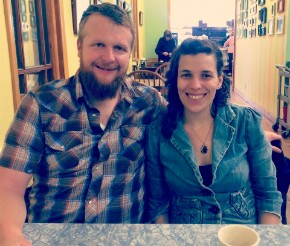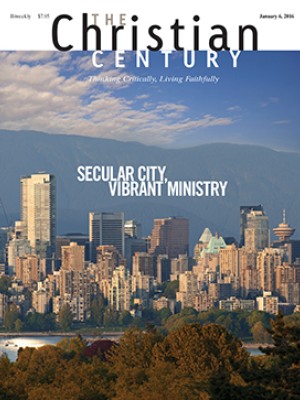Called together

"The first night we met,” said Rebecca Sumner, referring to her spouse, Luke Sumner, “we talked about church, personalities, and how we did ministry.” The two discussed planting churches that night—and eventually ended up planting one together.
Rebecca, a Quaker, loved the art of crafting beautiful worship and longed to return to her hometown of Everett, Washington, to start a worshiping community. Luke, who comes from the Foursquare Gospel churches, was serving a congregation in Portland that worshiped under a bridge. He enjoyed the nontraditional aspects of ministry on the street, working with people who lived outdoors, and didn’t feel called to serve as a lead pastor.
Read our latest issue or browse back issues.
As their relationship deepened and they began to discuss their future, they longed to share a religious tradition. Wanting to be a part of a denomination that affirms LGBTQ people and celebrates weekly communion, they considered the theology and practice of different denominations and decided to join the Disciples of Christ. The Disciples affirmed Luke’s call to a nontraditional ministry, and in 2014 both became commissioned ministers in the Disciples’ ordination discernment process, moved to Everett, and began to plant a church.
When the Sumners arrived in the town, they spent time getting to know their neighbors. Many of the community’s religious leaders realized that few resources existed for homeless people, except for the public library. Everett needed a hospitality house, and Luke was eager to open one.
With guidance from Hugh Hollowell at Love Wins, Luke began Our Common Ground, reaching people who live outside. It gathers on weekday mornings. The hope was that it would be a community organization, separate from the church, but sponsored by it.
In Advent, Rebecca began a worship service, called Our Common Table. She works to reorient the liturgy and psalms for the neighborhood. The service makes art supplies available for children throughout the service and includes a reflective time for everyone following communion.
During the week, the Sumners offer online morning and evening prayers for Everett. Through the community organization, the church, and the online prayers, the two hope to cross the boundaries between believers and atheists, between those who live in homes and those who live outside, between those who love church and those who have been burned by it.
Planting a church as a clergy couple works for them, they say, because they have different sets of skills. Rebecca is a vision caster and the driving force behind the worshiping community. She enjoys listening to people and doing the nitty-gritty work of pastoral care. Luke has gifts in administration and making sure that things get done on deadline. They both wanted to make sure that their church was committed to social justice, not just in theory but also in practice.
“I needed someone like Luke to push the justice issue,” Rebecca said. “I’ll create a beautiful liturgy, and Luke will say, ‘That means nothing to those who live outside.’” Luke appreciates being stretched as well. “I recognized the need for a gathered time of community—communion, prayer, and offering.”
They face the sexism that many clergy couples grapple with. When they explain their jobs to people, some respond, “It’s really great that Luke is willing to share his title with Rebecca!” Sometimes their different skill sets can be an asset, and other times they can cause frustration. When Rebecca expresses a dream, Luke may focus on the practical implications and everything that could go wrong. While a balance of skills is wonderful in an organization, it can create tension in a marriage.
Juggling personal care and professional expectations can also be challenging. When one partner is stressed, the other may want as a spouse to encourage the other to take some time off and get some rest, but want as a coworker to see that the job gets done.
When I asked the couple if they had any advice for clergy couples that might want to plant a church together, Rebecca spoke of the importance of having a group to help with discernment. “Get people whom you know and love in a group. Hash out if it’s the right thing. Is it the right thing for your call? Is it right for your marriage? What do you need?”
Luke spoke of the importance of being intentional about one’s gifts. “Sit down and talk about what you’re each good at. It’s easy to fall into what you’re good at, but it needs to be more upfront.”
Partners also need to talk about what they’re not good at, Rebecca said. They have a practice of asking questions like, “What was life-giving for you? What was draining? When did you feel supported by me? When were you not supported by me?” And it’s important to talk about boundaries. Since they are married, it is easy to slip into working all the time, the conversation quickly gravitating toward problems at work. For the Sumners, it is important to take a Sabbath together and not talk about work.
Though aware of the difficulties of their joint project, the Sumners find their work life-giving. “We’re missing a lot to gain a lot,” Rebecca said.







